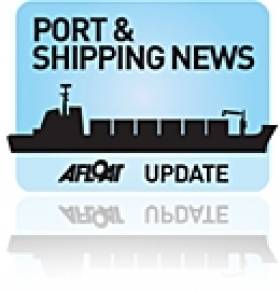Displaying items by tag: EU Transport Commissioner
ESPO Meets New EU Commissioner for Transport
#EUTransport - European ports work, they make transport work, make the economy work, make their environment work. That was the main message given by the European Sea Ports Organisation (ESPO) during their meeting today with the new EU Commissioner for Transport, Violeta Bulc.
Mrs Bulc met with ESPO Chairman, Santiago Garcia-Milà, ESPO Vice Chairs Eamonn O'Reilly (also Chief Executive of Dublin Port) and Annaleena Mäkilä and ESPO's Secretary General, Isabelle Ryckbost.
European port authorities need a policy that empowers them to successfully match commercial and public interests, and to meet the various challenges that both market forces and society imposes upon them.
Notwithstanding their diversity, European port authorities believe that more autonomy, be it commercial, financial and/or organisational will serve them best in facing the challenges ahead.
ESPO and the Commissioner exchanged views about the challenges ports are currently facing, and the vital role ports play for Europe's economy and growth.
In that respect, ESPO stressed that European ports are real drivers of economic prosperity and are to be seen as much more than a place where ships are simply loaded and unloaded.
Furthermore,the ESPO representatives outlined what European policy can do for ports and presented in that respect ESPO's recent memorandum, which highlights six points of attention for the new Commission and Parliament.
Finally, ESPO informed the Commissioner about its position regarding the port regulation proposal. ESPO stressed the importance of a EU ports policy that:
• Ensures full autonomy in setting charges and minimum requirements for port services
• Guarantees financial transparency where ports receive public funding
• Gives clear guidance on state aid for port investments.
ESPO Chairman Santiago Garcia-Milà asked for the support of the Commissioner on these points. "The Council has set important steps towards a more realistic and workable regulation. However, by letting Member States decide whether to give ports more autonomy or not, the Council risks to further undermine the level playing field between European ports. We want the autonomy of ports strengthened in Europe, as it was initially proposed by the Commission and is supported by the rapporteur in the European Parliament. We have asked Mrs Bulc to support us in that plea".
At the outcome of the meeting, ESPO's Secretary General Isabelle Ryckbost said: "We very much welcome the opportunity given by Commissioner Bulc for an open dialogue with ESPO and some of our members and we are very much honoured to have met Mrs Bulc early in her mandate. The Commissioner seems to understand both the diversity and potential of European ports. I am confident we can look forward to a constructive cooperation with the new Commissioner".
After the exchange of views with ESPO, the Commission also met with representatives of a selection of European ports for a two hour discussion on issues affecting the sector





























































